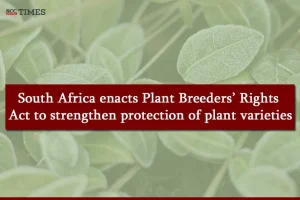On 6-6-2025, the Government of South Africa notified commencement of Plant Breeders’ Rights Act, 2018. The Act has come into operation with retrospective effect from 1-6-2025, introducing a modernized legal framework for the protection of new plant varieties, granting breeders exclusive intellectual property rights over their innovations.
Background:
The Plant Breeders’ Rights Act, 2018, was enacted to replace South Africa’s outdated 1976 law, which no longer met the needs of modern farming and plant science. It establishes a clear and modern legal system for recognizing and protecting the work of plant breeders.
Plant Breeders are those individuals or organizations who develop new and improved varieties of plants through research, crossbreeding, and innovation. This Act aims to encourage agricultural advancement by granting breeders exclusive rights over plant varieties that are new, distinct, uniform, and stable. These rights help breeders gain recognition and economic return for their efforts, fostering investment in crop development and food security.
In addition, the Act also aligns with the UPOV Convention (1991), an international treaty that standardizes the protection of plant breeders’ rights. This alignment strengthens the South Africa’s legal framework and position in global agricultural innovation while safeguarding the interests of both breeders and farmers.
Key Points of Plant Breeders’ Rights Act:
- This Act is designed to protect the intellectual property rights of plant breeders by granting them exclusive rights to produce, reproduce, sell, export, import, and license the propagation material of their protected plant varieties.
- Plant Breeders can pursue prevention of unauthorized use of those varieties by others. These rights apply for up to 25 or 30 years, depending on the type of plant, and which can be enforced through civil remedies in cases of infringement.
- The provisions apply to all plant genera and species, offering legal protection for new, distinct, uniform, and stable plant varieties. It also outlines exceptions and establishes the institutional mechanisms for administration and dispute resolution.
- The regulations also clarify categories of farmers and crops and streamline administrative processes to reduce delays ensuring effective balancing of breeders’ rights with public and agricultural interests.
- Plant breeders will now be able to give permission to others to use their protected plant varieties, like renting them out. In return, they can earn through royalty, whenever those plants are sold or used for profit.
-
This Act amends the Abolition of Restrictions on the Jurisdiction of Courts Act, 1996, and repeals the Plant Breeders’ Rights Act, 1976.
Editor’s Note:
While short title of the legislation Plant Breeders’ Rights Act, 2018, refers to year 2016, this appears to reflect because of drafting or initial proposal date. Although, all the official government records, including the Government Gazette, refer to the legislation as the Act 2018, which was notified in 2019. Accordingly, this article uses the ‘2018’ title in line with official designations.

